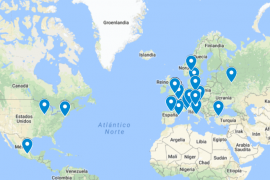[dropcap letter=”A”]
pparently, everything is ephemeral. Kids transmit their day to day life in real time, from the center of a small digital world that gets obsolete with each new message they send or publish, with every ingenious comment they leave on the networks, in a perpetual escape from what happened two minutes ago. Their will, in contrast to the aspirations that humanity had so far, is not lasting. The only thing that they record ultimately -with an intention in fact equally revocable- are tattoos. Maybe not knowing that everything else is also recorded. Although companies give the option to delete it immediately.
 Every day 2.5 trillion of data are generated on the internet. Every hour there are two million photos rising to Instagram, twenty million tweets are generated. And while the global analysis of these data is the great challenge of the future, the past of each persona floats in cyberspace. At first, we thought that everything we wrote on Twitter would be so private and defiant as those graffiti at the door of a public toilet. That what we uploaded to Facebook replaced the boring slide projections with friends, who wanted to show how nicely the holidays were spent.
Every day 2.5 trillion of data are generated on the internet. Every hour there are two million photos rising to Instagram, twenty million tweets are generated. And while the global analysis of these data is the great challenge of the future, the past of each persona floats in cyberspace. At first, we thought that everything we wrote on Twitter would be so private and defiant as those graffiti at the door of a public toilet. That what we uploaded to Facebook replaced the boring slide projections with friends, who wanted to show how nicely the holidays were spent.
But the rules have changed. Privacy does not exist anymore, and everything you say may be used against you. A friend of mine pointed out that we should not talk about digital memory, but about “digital tattoos”. And the truth is that almost nobody remembers the outbursts, family photographs, observations and bad jokes that at some point has had the need to share. The human must be the only mammal that exhibits himself instead of camouflaging. Tweets and retweets have become those sins from youth covering a skin that shows age. There lies the mark of what we did in a burst, jokingly, only to provoke. It can become a stigma. To what extent and until when we still are the person we were?



















